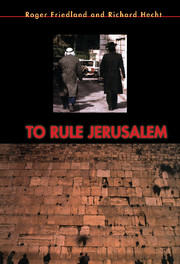Book contents
- Frontmatter
- Contents
- List of Illustrations
- Preface
- Acknowledgments
- Introduction
- 1 A Fearful Fusion
- Part I The Two Zions: Jews Against Zionism in Jerusalem
- Part II Zion Divine: Jerusalem as the Messianic Central City
- 6 A Few Footsteps for the Messiah
- 7 Staking the Claim in Judea and Samaria
- 8 Building the Capital
- 9 Suburbs of the Messiah
- 10 Defensible Borders
- Part III Birth of a Nation
- Part IV Heart of Stone
- Notes
- Index
10 - Defensible Borders
Published online by Cambridge University Press: 13 May 2010
- Frontmatter
- Contents
- List of Illustrations
- Preface
- Acknowledgments
- Introduction
- 1 A Fearful Fusion
- Part I The Two Zions: Jews Against Zionism in Jerusalem
- Part II Zion Divine: Jerusalem as the Messianic Central City
- 6 A Few Footsteps for the Messiah
- 7 Staking the Claim in Judea and Samaria
- 8 Building the Capital
- 9 Suburbs of the Messiah
- 10 Defensible Borders
- Part III Birth of a Nation
- Part IV Heart of Stone
- Notes
- Index
Summary
Like most Israelis, Jewish settlers regard Israel's pre-1967 borders as indefensible; “Auschwitz borders,” Abba Eban once called them. This is not just a strategic assessment. The religious nationalists of Gush Emunim consider these frontiers to be morally indefensible.
When a people uses violence, it is an instrument, a tool by which to try pry loose resources unobtainable by other means. But violence is also an expression of commitment, a demonstration of what one holds most dear. Violence leaves bloody traces: wounds and corpses. It marks a community's values on human bodies, through blood sacrifices that only make sense in terms of the purposes for which they were offered. Violence is a language; force simultaneously a physical and a moral phenomenon. Efforts to decompose it must inevitably crumble.
Terms of Engagement
The row houses of Ofra, a Jewish suburb to the north of Jerusalem, are planted in deep red soil at the foot of Ba'al Hatzor, the highest mountain in Samaria. It should be an easy commute to Jerusalem, not unlike that separating the San Fernando Valley from Westwood; Hertford from London; or Melun from Paris. But to travel these fifteen miles along the ridge descending into the city, one has to drive through miles of Palestinian villages, smack through Ramallah and El-Bira, a major Arab metropole. Commuting to Jerusalem's Jewish suburbs has been dangerous for a long time.
Years before the intifada, everyone had traumatic stories. Endlessly repeated and strung end to end, these stories transformed a short drive into an ordeal. Every bend in the road could conceal a young man with a Molotov cocktail. Schoolchildren clustered at the road's edge could metamorphosize into a hostile gang.
- Type
- Chapter
- Information
- To Rule Jerusalem , pp. 213 - 242Publisher: Cambridge University PressPrint publication year: 1996

